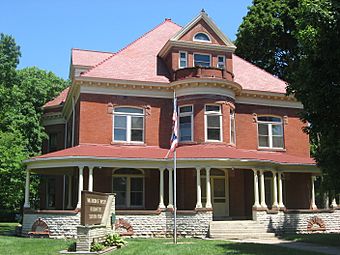Seip House facts for kids
Quick facts for kids |
|
|
Seip House
|
|

Front of the house
|
|
| Location | 345 Allen Ave., Chillicothe, Ohio |
|---|---|
| Area | less than one acre |
| Built | 1895 |
| Architect | John Cook |
| Architectural style | Queen Anne |
| NRHP reference No. | 81000450 |
| Added to NRHP | May 12, 1981 |
The Seip House is a beautiful old building in Chillicothe, Ohio, United States. It was built in 1895 and is one of the most impressive homes in the city. This house has a rich history, connected to a successful businessman and his family.
Contents
The Story of Charles Seip
Charles Seip was born in Germany in the late 1810s. He was a butcher by trade. In 1845, he moved to the United States. Soon after, he settled in Chillicothe, Ohio.
Starting a Business
In Chillicothe, Charles Seip opened his own butcher shop on Allen Avenue. He worked hard, got married, and became very successful. As his business grew, he opened more shops downtown. He also started buying farms near Chillicothe. This helped him get more animals for his butcher business.
Building the Seip House
By the 1890s, Charles Seip's son, John, convinced his father to build a large house. They decided to build it right where the first butcher shop used to be.
House Design and Construction
Building the Seip House took four years. It started in 1895 and was finished in 1898. The house has two and a half stories. It was designed by an architect named John Cook. The building is made of brick and sits on a strong sandstone foundation. Its roof is covered with slate tiles and has a hip roof style, which means it slopes up to the center.
A Historic Landmark
When Charles Seip passed away in 1902, he owned many important properties in Ross County. His house was known as one of the best examples of Queen Anne homes in Chillicothe. He also owned seven different farms in the area.
The House Today
Over the years, the Seip House has had different owners. In 1955, the Ohio Department of Natural Resources bought the house. They turned it into offices for their regional forestry headquarters. Because of its special design and history, the Seip House was added to the National Register of Historic Places in 1981. This means it is recognized as an important historic building.



